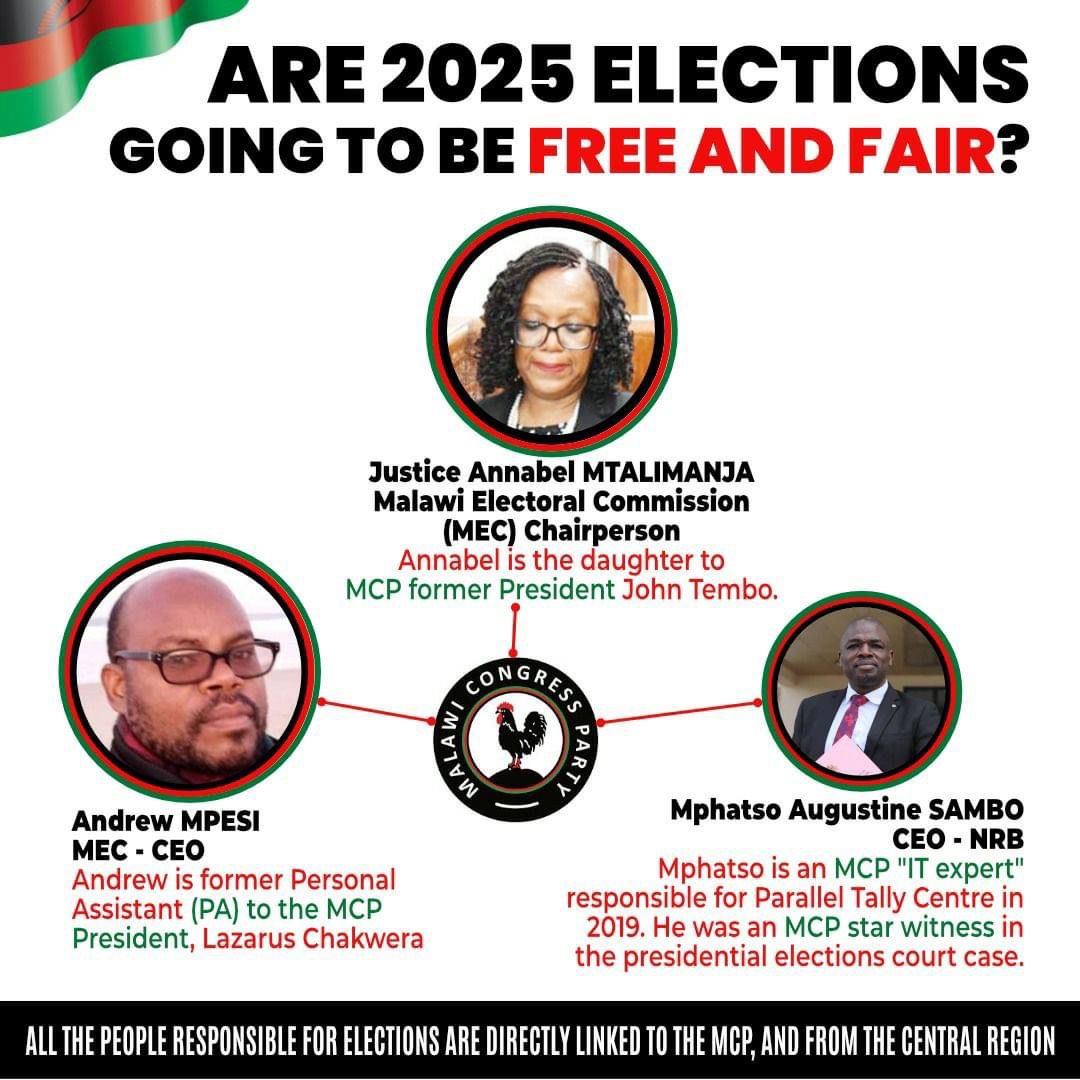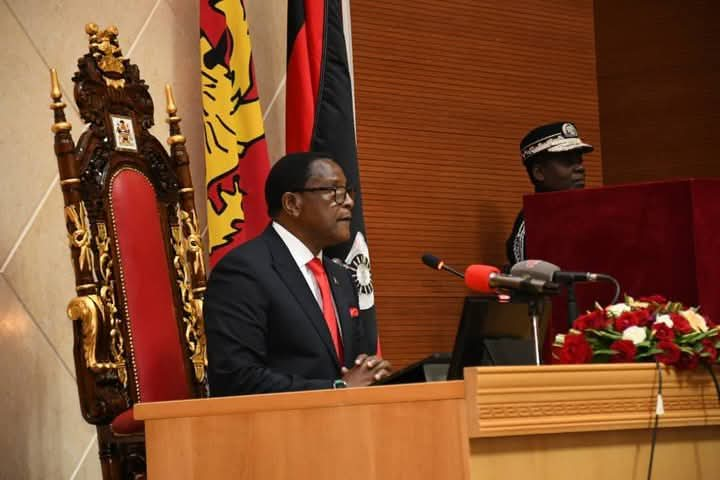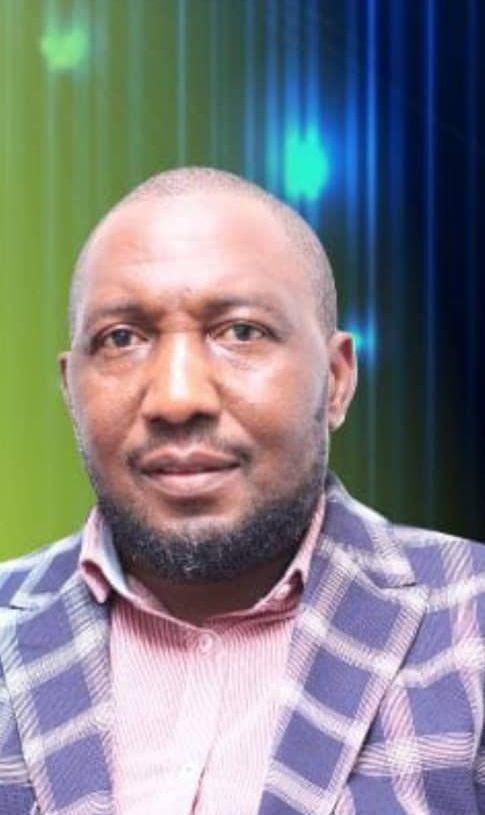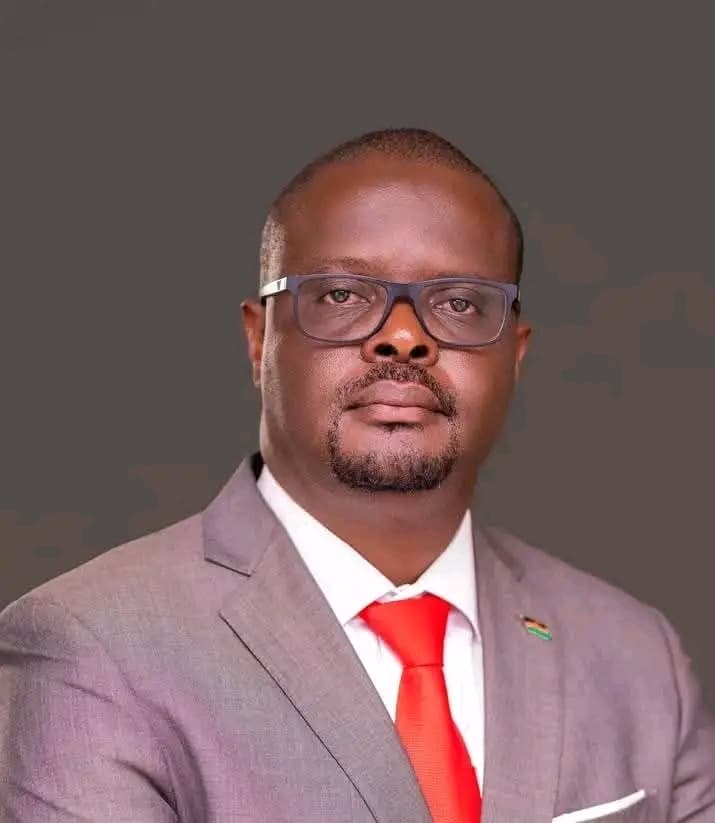By Twink Jones Gadama
Malawi’s upcoming 2025 general elections have raised concerns about fairness and transparency, sparking fears that the country’s democratic foundations may be undermined. The ties between key electoral officials and the ruling party have created an environment conducive to electoral manipulation.
Justice Annabel Mtalimanja, chairperson of the Malawi Electoral Commission, is the daughter of the late former president of the Malawi Congress Party, a connection that raises questions about her impartiality. Her family loyalty may influence her decisions, potentially favoring the MCP. Furthermore, Andrew Mpesi, the commission’s chief elections officer, previously served as personal assistant to MCP President Lazarus Chakwera, who is also the current president and endorsed presidential candidate.
- Is Malawi’s public health system collapsing in silence? A nation left to suffer while leaders look awayBy The Editorial Board Malawi’s public health system is slowly collapsing—and doing so in deadly silence. In hospitals and health…
- DPP’s Namalomba, don’t silence the rumors — They may be the voice of the peopleBy Allan Ngumuya Good morning, and allow me to speak from the heart. This is a plea to the Democratic…
- Political winds and policy promises: Malawi’s Week in ReviewBy Burnett Munthali This past week on Malawi Freedom Network, a string of high-profile political developments, campaign declarations, and public…
- Atupele Muluzi Vows Economic Revival, Blasts Rivals on Whistle-Stop TourBy Suleman Chitera, Blantyre, Malawi – July 5, 2025 United Democratic Front (UDF) president Atupele Muluzi has pledged to restore…
- Atupele Muluzi Dismisses Coalition Rumors with MCP Ahead of September PollsBy Suleman Chitera | Blantyre, Malawi United Democratic Front (UDF) leader Atupele Muluzi has firmly denied growing speculation that he…
- Atupele Muluzi Launches Whistle-Stop Rallies in Blantyre, Southern Region UDF Declares Him “Hope for Malawi”By Suleman Chitera | Makhetha, Blantyre United Democratic Front (UDF) President Atupele Muluzi has kickstarted a series of whistle-stop rallies…
- Sheikh Idrissah Muhammad Laments Moral Decay During Independence PrayersBy Suleman Chitera | Lilongwe, Malawi The Chairperson of the Muslim Association of Malawi (MAM), Sheikh Idrissah Muhammad, has blamed…
- Catherine Mwafulirwa vows to revive tourism and modern agriculture in Karonga as AFORD intensifies campaignBy Burnett Munthali Aspiring Member of Parliament for Karonga Town Constituency under the Alliance for Democracy (AFORD), Catherine Mwafulirwa, has…
- Kabambe pledges restoration of Malawi’s “Lost Glory” at Zomba Rally, slams government over poor servicesBy Burnett Munthali UTM Party President Dr. Dalitso Kabambe has pledged to restore Malawi to its “lost glory” if voted…
- Kabambe promises economic turnaround and K100 billion annual development package if elected in SeptemberBy Burnett Munthali UTM Party leader Dalitso Kabambe has declared that once he assumes office in September this year, Malawi’s…
- Kamphangala casts doubt for opposition parties attending Independence celebrationsBy Vincent Gunde A Malawi Congress Party (MCP) diehard of Mvera in Dowa district Mr. Rodgers Kamphangala, has expressed doubts…
Mphatso Augustine Sambo, CEO of the National Registration Bureau and MCP IT expert, played a pivotal role in the disputed 2019 presidential elections. His involvement in the parallel tally center and testimony in the subsequent court case fuels mistrust. Consequently, the credibility of Malawi’s electoral institutions suffers due to these connections. Citizens may view the elections as rigged, leading to disillusionment and apathy.
Moreover, the international community has expressed concerns over Malawi’s commitment to free and fair elections. Donors and observers will scrutinize the process, potentially withholding support. Malawi’s electoral challenges are multifaceted, including inadequate voter education, limited access to voting stations, insufficient electoral infrastructure and bias in state-owned media.
Therefore, ensuring impartiality within electoral institutions is crucial. Providing transparent funding and resource allocation, promoting voter education and awareness, and fostering inclusive dialogue among stakeholders are essential steps. The Malawi Electoral Commission’s independence is vital, and its decisions should be free from political interference.
Meanwhile, international observers’ presence can enhance credibility. Civil society organizations, such as the Malawi Human Rights Commission and the Centre for Human Rights and Rehabilitation, must hold authorities accountable. The 2025 elections’ outcome will significantly impact Malawi’s democratic trajectory.
In addition, the country’s history of electoral disputes underscores the need for robust safeguards. The 2019 presidential election controversy highlighted weaknesses in the electoral system. Consequently, reforms were implemented, but their effectiveness remains uncertain.
However, some argue that Malawi’s democratic institutions have matured. The country has made significant strides in promoting transparency and accountability. Nevertheless, concerns persist about the ruling party’s influence on electoral officials.
To mitigate these risks, Malawi must prioritize electoral reforms. Strengthening institutions, promoting voter education and ensuring transparency are essential. The international community should provide support, while civil society organizations must advocate for accountability.
The role of traditional leaders, civil society and the media is vital in promoting electoral awareness. Community engagement initiatives can enhance voter participation. Conversely, misinformation and disinformation can undermine the electoral process.
Furthermore, the Electoral Commission must address logistical challenges. Voting materials, polling stations and personnel must be adequately prepared. Technical support and infrastructure development are crucial.
The 2025 elections will test Malawi’s commitment to democracy. Ensuring free and fair elections requires collective efforts from stakeholders. International organizations, such as the United Nations Development Programme and the European Union, have provided electoral assistance.
Malawi’s democratic future hangs in the balance. Effective electoral reforms, transparent institutions and inclusive dialogue can safeguard democracy.
The 2025 elections will test Malawi’s commitment to democracy. Ensuring free and fair elections requires collective efforts from stakeholders. International organizations have provided electoral assistance.
In conclusion, to ensure free, fair and credible results, the “Big Three” should not be found at the Malawi Electoral Commission. Their connections to the ruling party compromise the electoral process. Effective electoral reforms, transparent institutions and inclusive dialogue can safeguard democracy.
The Malawi Electoral Commission’s Strategic Plan 2023-2028 emphasizes the importance of independence, transparency and accountability. Implementing this plan requires strong leadership, unbiased decision-making and robust safeguards.
Ultimately, Malawi’s democratic future depends on the integrity of its electoral process. The “Big Three” must prioritize national interest over personal loyalty to ensure credible elections.
The international community, civil society and traditional leaders must hold Malawi’s electoral officials accountable. Collective efforts can safeguard democracy and promote free and fair elections.
Malawi’s 2025 elections are a critical juncture in its democratic journey. Ensuring electoral integrity requires decisive action against conflicts of interest.
By prioritizing impartiality and transparency, Malawi can uphold democratic principles and consolidate its democratic gains. The “Big Three” must step aside to guarantee free, fair and credible elections.





